新概念英语第二册Lesson 1 A private conversation课件(53张PPT无素材)
文档属性
| 名称 | 新概念英语第二册Lesson 1 A private conversation课件(53张PPT无素材) |  | |
| 格式 | zip | ||
| 文件大小 | 5.7MB | ||
| 资源类型 | 教案 | ||
| 版本资源 | 新概念英语 | ||
| 科目 | 英语 | ||
| 更新时间 | 2021-01-22 21:35:26 | ||
图片预览

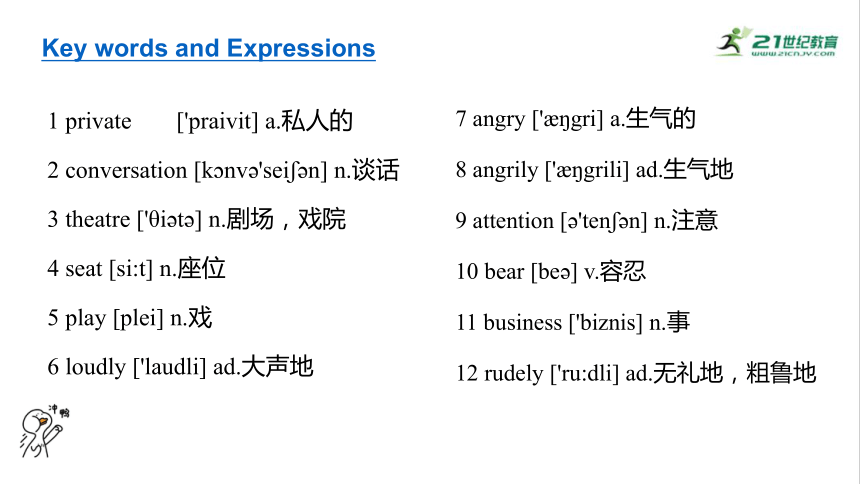
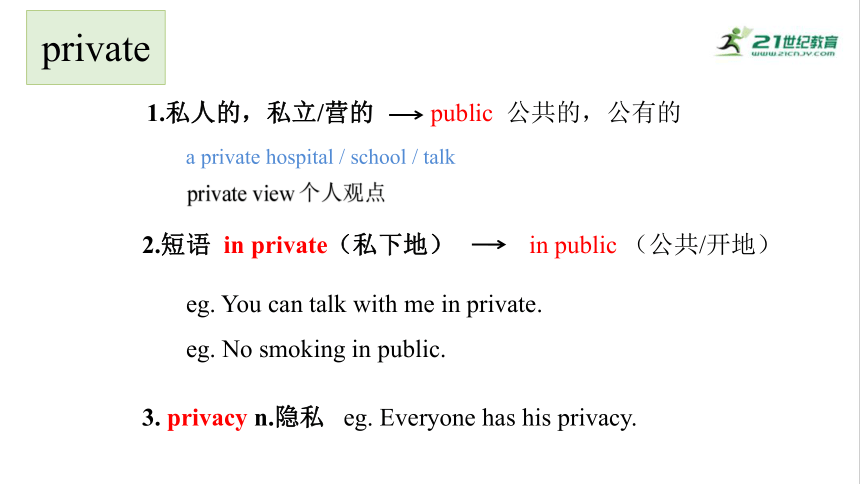

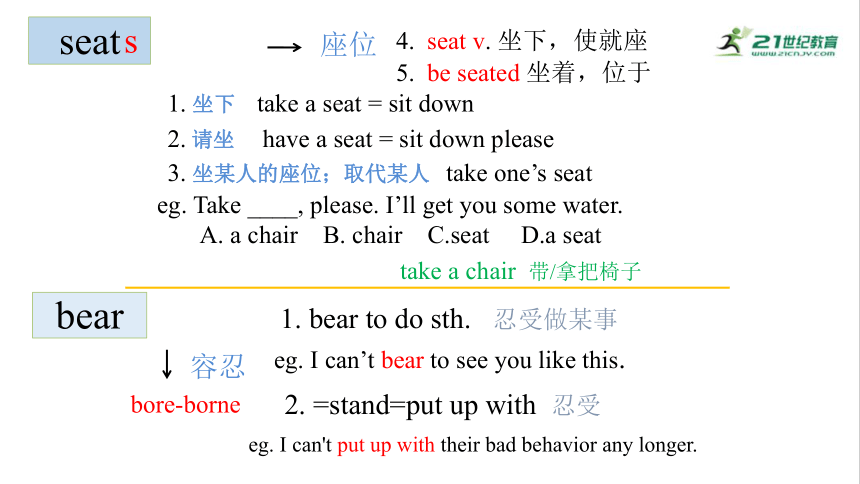
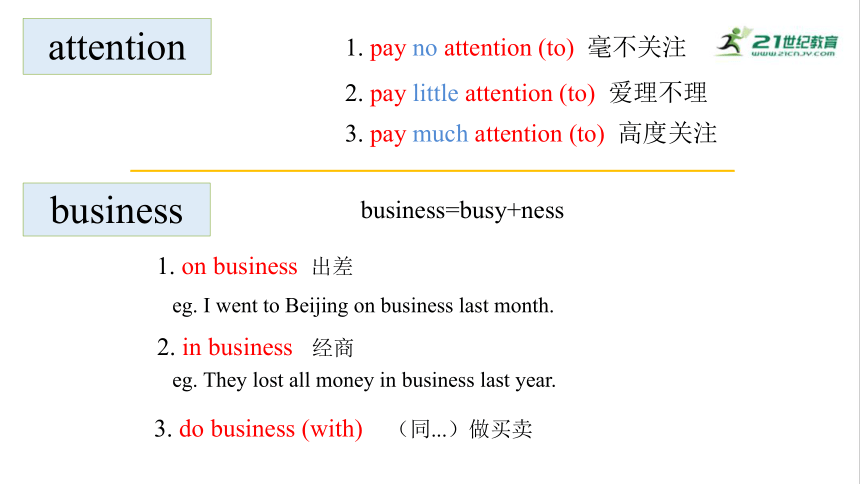
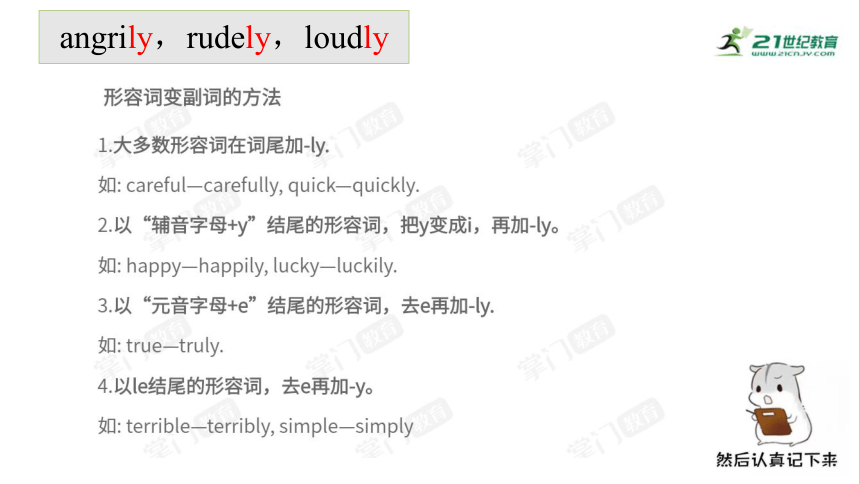
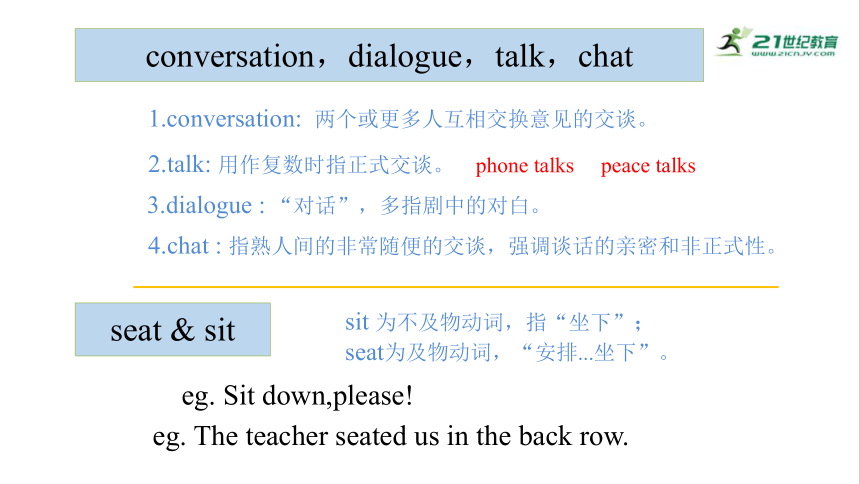
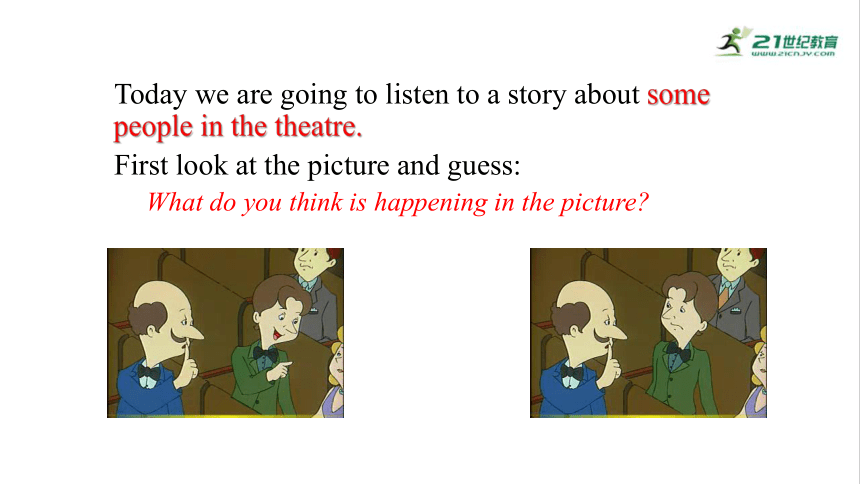
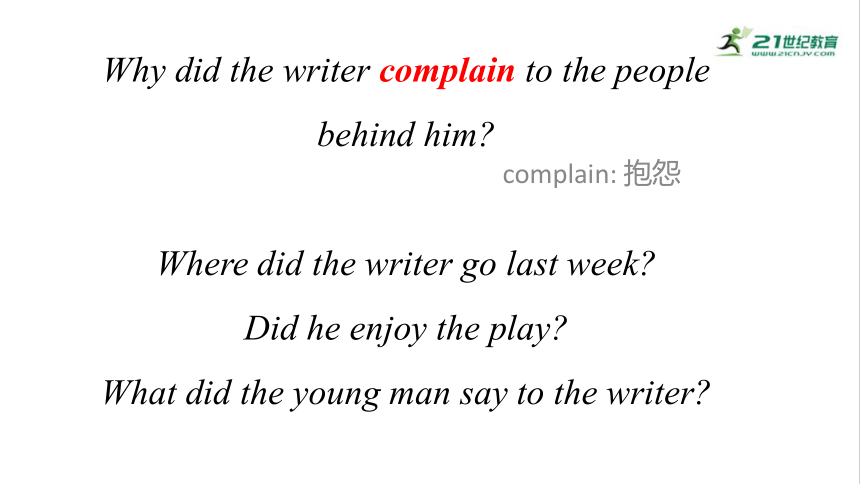
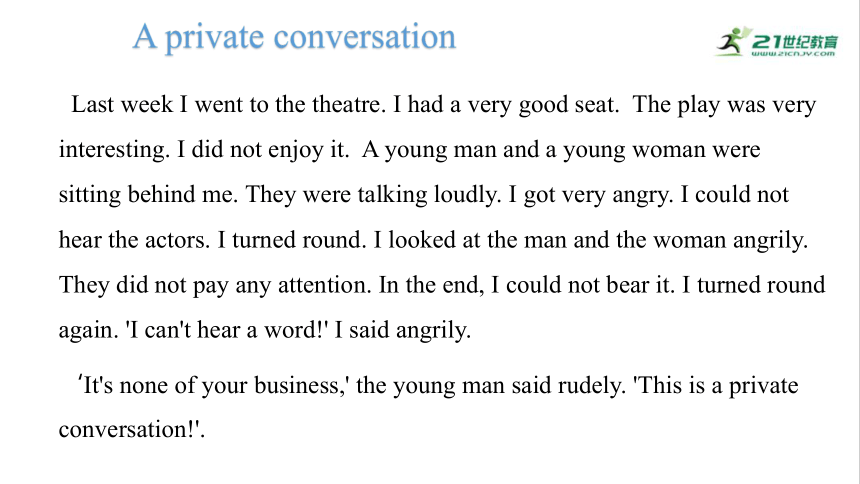
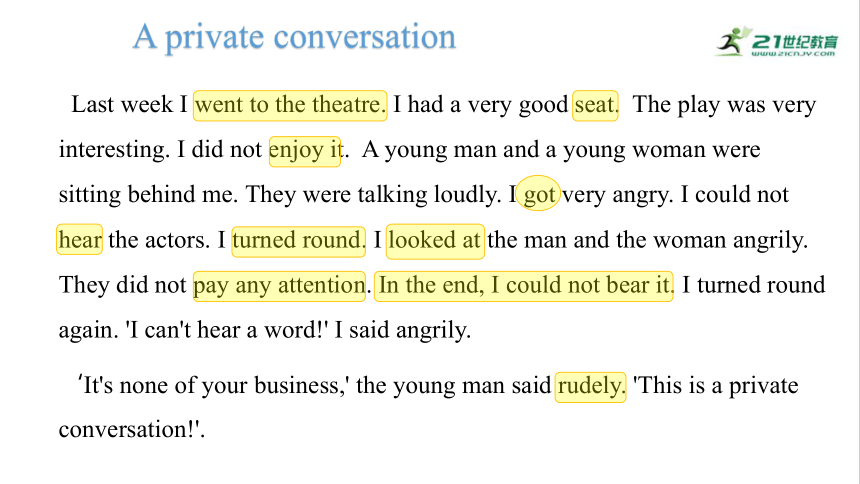
文档简介
(共53张PPT)
New
Concept
English
Practice
&
progress
制作人:Sunny
Chen
Lesson
1
A
private
conversation
1
private
['praivit]
a.私人的
2
conversation
[k?nv?'sei??n]
n.谈话
3
theatre
['θi?t?]
n.剧场,戏院
4
seat
[si:t]
n.座位
5
play
[plei]
n.戏
6
loudly
['laudli]
ad.大声地
7
angry
['??gri]
a.生气的
8
angrily
['??grili]
ad.生气地
9
attention
[?'ten??n]
n.注意
10
bear
[be?]
v.容忍
11
business
['biznis]
n.事
12
rudely
['ru:dli]
ad.无礼地,粗鲁地
Key
words
and
Expressions
1.私人的,私立/营的
public
公共的,公有的
private
2.短语
in
private(私下地)
in
public
(公共/开地)
eg.
You
can
talk
with
me
in
private.
eg.
No
smoking
in
public.
3.
privacy
n.隐私
eg.
Everyone
has
his
privacy.
a
private
hospital
/
school
/
talk
private
view
个人观点
conversation
1.
have
a
conversation
with
sb.
强调一种无拘束,非正式的交谈
eg.
I
had
a
conversation
with
my
friends
yesterday.
play
1.玩
play
the
game
2.演奏;打/踢(球)
play
the
piano;
play
football
3.
扮演/演戏
play
a
role
in
4.名词“戏剧”
cosplay=
costume
play
eg.
Iphone
is
playing
a
key
role
in
our
life.
chat
n.闲聊
/
talk
n.谈话
2.
be
in
conversation
(with)...
(与...)交谈中
seat
1.
坐下
take
a
seat
=
sit
down
3.
坐某人的座位;取代某人
take
one’s
seat
座位
s
2.
请坐
have
a
seat
=
sit
down
please
take
a
chair
带/拿把椅子
eg.
Take
____,
please.
I’ll
get
you
some
water.
A.
a
chair
B.
chair
C.seat
D.a
seat
4.
seat
v.
坐下,使就座
5.
be
seated
坐着,位于
bear
容忍
bore-borne
1.
bear
to
do
sth.
忍受做某事
2.
=stand=put
up
with
忍受
eg.
I
can’t
bear
to
see
you
like
this.
eg.
I
can't?put
up
with?their
bad
behavior
any
longer.
attention
1.
pay
no
attention
(to)
毫不关注
2.
pay
little
attention
(to)
爱理不理
3.
pay
much
attention
(to)
高度关注
business
business=busy+ness
eg.
I
went
to
Beijing
on
business
last
month.
1.
on
business
出差
3.
do
business
(with)
(同...)做买卖
2.
in
business
经商
eg.
They
lost
all
money
in
business
last
year.
angrily,rudely,loudly
conversation,dialogue,talk,chat
1.conversation:
两个或更多人互相交换意见的交谈。
2.talk:
用作复数时指正式交谈。
phone
talks
peace
talks
3.dialogue
:
“对话”,多指剧中的对白。
4.chat
:
指熟人间的非常随便的交谈,强调谈话的亲密和非正式性。
seat
&
sit
sit
为不及物动词,指“坐下”;seat为及物动词,“安排...坐下”。
eg.
The
teacher
seated
us
in
the
back
row.
eg.
Sit
down,please!
Today
we
are
going
to
listen
to
a
story
about
some
people
in
the
theatre.
First
look
at
the
picture
and
guess:
What
do
you
think
is
happening
in
the
picture?
Why
did
the
writer
complain
to
the
people
behind
him?
Where
did
the
writer
go
last
week?
Did
he
enjoy
the
play?
What
did
the
young
man
say
to
the
writer?
complain:
抱怨
Last
week
I
went
to
the
theatre.
I
had
a
very
good
seat.
The
play
was
very
interesting.
I
did
not
enjoy
it.
A
young
man
and
a
young
woman
were
sitting
behind
me.
They
were
talking
loudly.
I
got
very
angry.
I
could
not
hear
the
actors.
I
turned
round.
I
looked
at
the
man
and
the
woman
angrily.
They
did
not
pay
any
attention.
In
the
end,
I
could
not
bear
it.
I
turned
round
again.
'I
can't
hear
a
word!'
I
said
angrily.
‘It's
none
of
your
business,'
the
young
man
said
rudely.
'This
is
a
private
conversation!'.
A
private
conversation
Last
week
I
went
to
the
theatre.
I
had
a
very
good
seat.
The
play
was
very
interesting.
I
did
not
enjoy
it.
A
young
man
and
a
young
woman
were
sitting
behind
me.
They
were
talking
loudly.
I
got
very
angry.
I
could
not
hear
the
actors.
I
turned
round.
I
looked
at
the
man
and
the
woman
angrily.
They
did
not
pay
any
attention.
In
the
end,
I
could
not
bear
it.
I
turned
round
again.
'I
can't
hear
a
word!'
I
said
angrily.
‘It's
none
of
your
business,'
the
young
man
said
rudely.
'This
is
a
private
conversation!'.
A
private
conversation
Last
week
I
went
to
the
theatre.
go
to
the
theatre:
去看戏
go
to
the
cinema:
去看电影
TEXT
go
to
the
theatre
to
see
a
play
go
to
the
cinema
to
see
a
film
go
to
the
post
office
to
send
a
letter
go
to
the
bank
to
save/deposit
money
go
to
the
bed/school/church/hospital
Last
week
I
went
to
the
theatre.
I
had
a
very
good
seat.
go
to
the
theatre:
去看戏
go
to
the
cinema:
去看电影
Take/Have
a
seat,
please.请坐。
TEXT
I
did
not
enjoy
it.
The
play
was
very
interesting.
intersting:
修饰sth.
intersted:
修饰sb.
enjoy
n.
享受...
enjoy
doing
sth.
喜欢做...
enjoy
oneself
=
have
a
good
time
玩得开心
A
young
man
and
a
young
woman
were
sitting
behind
me.
They
were
talking
loudly.
I
got
very
angry.
I
could
not
hear
the
actors.
过去进行时:主+was/were+doing+其他.
get:指天气冷暖,长短的变化
become:指身份,地位的改变
They
did
not
pay
any
attention.
I
turned
round.
I
looked
at
the
man
and
the
woman
angrily.
同义:turn
around
1.支付(价款等)
pay...for...
2.
给予(注意等)
pay
attention
3.去(访问)
pay
a
visit
4.
工资,报酬
n.
my
pay
They
did
not
pay
any
attention.
1.支付(价款等)
pay...for...
2.
给予(注意等)
pay
attention
3.去(访问)
pay
a
visit
4.
工资,报酬
n.
my
pay
pay
attention
to
…
They
did
not
pay
any
attention
(to
me).
Please
pay
attention
to
the
picture
on
the
wall.
In
the
end,
I
could
not
bear
it.
I
turned
round
again.
1.
承受,承担
bear
the
money
2.
忍受
(一般与can/could连用在疑问和否定句)
I
can’t
bear
living
here.
in
the
end
=
at
last,
finally
比较:at
the
end
of
…
bear
it
=
stand
it
忍受,容忍
It
指代前面所描述的情形
‘
I
can’t
hear
a
word!’
I
said
angrily.
hear:
听见(强调结果)
listen
to:
听(强调过程)
listen
to
?
hear
look
at
?
see
look
for
?
find
look
at
see
saw
seen
watch
read
read
read
‘It’s
none
of
your
business,’
the
young
man
said
rudely.
‘This
is
a
private
conversation.’
1.
none
of
:
在祈使句中表达一种断然,粗暴的口气。
2.
sb’s
business:
指某人(所关心的或份内)的事。
None
of
your
business.
Last
week
I
went
to
the
theatre.
I
had
a
very
good
seat.
The
play
was
very
interesting.
I
did
not
enjoy
it.
A
young
man
and
a
young
woman
were
sitting
behind
me.
They
were
talking
loudly.
I
got
very
angry.
I
could
not
hear
the
actors.
I
turned
round.
I
looked
at
the
man
and
the
woman
angrily.
They
did
not
pay
any
attention.
In
the
end,
I
could
not
bear
it.
I
turned
round
again.
'I
can't
hear
a
word!'
I
said
angrily.
‘It's
none
of
your
business,'
the
young
man
said
rudely.
'This
is
a
private
conversation!'.
A
private
conversation
adj
or
adv
angry/angrily
rude/rudely
loud/loudly
quiet/quietly
The
writer
got
very
____.
That’s
why
he
looked
at
them
____.
All
his
classmates
do
not
like
him
because
he
is
____.
He
always
speaks
to
others
____.
The
teacher
has
a
____
voice.
He
likes
to
speaking
____.
He
always
says
that
he
can’t
hear
us
if
we
don’t
talk
_____.
Listen.
It’s
very
____
in
the
reading
room.
Everybody
is
reading
their
books
____.
So,
please
keep
____.
It
is
____
to
talk
____
at
the
theatre.
People
will
get
____
with
us.
Where
did
you
go
last
week?
Did
you
have
a
good
seat?
Was
it
an
interesting
play?
You
enjoyed
the
play,
didn't
you?
Who
was
sitting
behind
you?
Could
you
hear
what
the
actors
were
saying?
Why
couldn't
you
hear?
What
were
they
doing?
Did
you
get
angry
with
them
or
not?
You
turned
round,
didn't
you?
How
did
you
look
at
them?
They
didn't
pay
any
attention,
did
they?
Could
you
bear
it?
What
did
you
do
then?
What
did
the
young
man
say?
Where
did
you
go
last
week?
Did
you
have
a
good
seat?
Was
it
an
interesting
play?
You
enjoyed
the
play,
didn't
you?
Who
was
sitting
behind
you?
Could
you
hear
what
the
actors
were
saying?
Why
couldn't
you
hear?
What
were
they
doing?
Did
you
get
angry
with
them
or
not?
You
turned
round,
didn't
you?
How
did
you
look
at
them?
They
didn't
pay
any
attention,
did
they?
Could
you
bear
it?
What
did
you
do
then?
What
did
the
young
man
say?
(To
】the
theatre.)
(Yes,
I
did.)
(Yes,
it
was.)
(No,
I
didn't.)
(A
young
man
and
a
young
woman.)
(No,
I
couldn't.)
(They
were
talking
loudly.)
(Talking
loudly.)
(Yes,
I
did.)
(Yes,
I
did.)
(Angrily.)
(No,
they
didn't.)
(No,
I
couldn't.)
(I
turned
round
again
and
said
angrily,
‘I
can't
hear
a
word!’)
(
‘It's
none
of
your
business.
This
is
a
private
conversation!’)
What’s
so
funny
of
the
story?
The
young
man
misunderstood
the
writer.
He
thought
the
writer
was
eavesdropping
them.
But
in
fact,
the
writer
did
not
want
to
listen
to
them
at
all.
He
just
wanted
to
hear
the
actors.
Follow
the
pattern
:
I
looked
at
the
man
and
the
woman
angrily.
walk
across
the
stage
-
slow
S1:
How
did
she
walk
across
the
stage?
S2:
She
walked
very
slowly
across
the
stage.
behave
at
the
theatre
-
rude/bad
drive
through
the
park
-
quick/slow
sleep
on
the
train
-
sound/quiet
listen
to
his
story
-
patient/careful
I
could
not
hear
the
actors.
I
can't
hear
a
word!
hear
the
radio
S1:I
can
hear
the
radio
now.
Can
you?
S2:Of
course
I
can.
I
can
hear
it
perfectly
well.
hear
the
actors
hear
the
rain
hear
his
voice
hear
some
music
see
those
men
see
the
theatre
see
the
policeman
see
her
house
Last
week
I
went
to
the
theatre.
I
went
to
the
theatre
last
week
.
last
night
-
a
good
talk
on
the
radio
(saw
or
heard)
S:I
heard
a
good
talk
on
the
radio
last
night.
(saw
or
heard)
just
now
-
a
voice/knock
at
the
door
last
night
-
a
cry/shout
outside
at
lunch
-
a
fly/hair
in
my
soup
last
week
-
a
camel/monkey
at
the
zoo
I
could
not
hear
the
actors.
I
could
not
bear
it.
Why?
The
noises
were
too
loud.
see
the
race
-
large
crowd
S1:
Didn't
you
see
the
race?
S2:
I
couldn't.
The
crowd
was
too
large.
read
the
letter
-
small/bad
writing
see
her
face
-
poor/bad
light
swim
in
the
lake
-
could/deep
water
finish
your
lunch
-
hot/salty
food
Tell
the
story
1
Last
week
-
went
-
theatre
2
didn't
enjoy
-
play
3
young
man
-
woman
-
behind
me
4
talking
loudly
5
could
not
-
actors
6
I
turned
-
and
looked
-
angrily
7
didn't
pay
-
attention
8
In
the
end
-
couldn't
bear
9
‘can't
hear
-
word’
-
said
10
‘none
-
business’
-
man
-‘private’
Topics
for
discussion
When
did
you
last
go
to
the
theatre/cinema?
Tell
us
about
the
play/film.
Do
you
get
angry
easily?
What
sort
of
thing
makes
you
angry?
Do
you
think
it’s
ok
to
have
a
private
conversation
at
the
theatre?
Summary
writing
Where
did
the
writer
go
last
week?
Did
he
enjoy
the
play
or
not?
Who
was
sitting
behind
him?
Were
they
talking
loudly,
or
were
they
talking
quietly?
Could
the
writer
hear
the
actors
or
not?
Did
he
turn
round
or
not?
What
did
he
say?
Did
the
young
man
say,
‘The
play
is
not
interesting,
‘or
did
he
say,
’This
is
a
private
conversation!‘?
Summary
writing
Where
did
the
writer
go
last
week?
Did
he
enjoy
the
play
or
not?
Who
was
sitting
behind
him?
Were
they
talking
loudly,
or
were
they
talking
quietly?
Could
the
writer
hear
the
actors
or
not?
Did
he
turn
round
or
not?
What
did
he
say?
Did
the
young
man
say,
‘The
play
is
not
interesting,
‘or
did
he
say,
’This
is
a
private
conversation!‘?
The
writer
went
to
the
theatre
last
week.
He
did
not
enjoy
the
play.
A
young
man
and
a
young
woman
were
sitting
behind
him.
They
were
talking
loudly.
The
writer
could
not
hear
the
actors.
He
turned
round.
‘I
can't
hear
a
word!’
he
said.
‘This
is
a
private
conversation!’
the
young
man
said.
一
般
过
去
时
一般过去时:
①表示过去的某种状况,即过去所存在的状态(be动结构)
结构:
肯:主语+
was/were
+其它.
(n./adj./prep.)
否:主语+
was/were
+not
+其它.
一般疑问:Was/Were+主语
+其它?
特殊疑问:找词变句
(1.was/were后加not;
2.
some
→
any)
(1.Was/Were提前大写;
2.
第一人称
→
第二人称
3.
some
→
any)
5.请根据提示填空。
①Yes,
I
was
at
the
greengrocer’s
on
Thursday.(根据本句提问)
you
on
Thursday?
②They
were
at
the
doctor’s
yesterday
morning.(对划线部分提问)
they
yesterday
morning?
③
office,
she
,
the
,
Monday,
at
,was,
on
(连词成句)
.
6.
Translation.翻译
①
他们上周工作(at
work)了么?
?
②
昨天下午你在哪儿?
?
是的,他们工作了。
.
我在家。
.
5.请根据提示填空。
①Yes,
I
was
at
the
greengrocer’s
on
Thursday.(根据本句提问)
you
on
Thursday?
②They
were
at
the
doctor’s
yesterday
morning.(对划线部分提问)
they
yesterday
morning?
③
office,
she
,
the
,
Monday,
at
,was,
on
(连词成句)
.
6.
Translation.翻译
①
他们上周工作(at
work)了么?
?
Were
at
the
greengrocer’s
were
Where
She
was
at
the
office
on
Monday
Were
they
at
work
last
week
Yes,
they
were
②
昨天下午你在哪儿?
?
是的,他们工作了。
.
我在家。
.
at
home
I
was
肯定句:
主语+
Ved
+其它。
②表示过去发生的动作或行为。(实义动词的结构)
1.一般情况直接+
2.以不发音字母e结尾直接+
3.以辅音字母+y结尾的,变
4.辅元辅结尾,该音节重读,双写尾字母+
5.不规则变化。
如:slip,
plan,
stop,
prefer(更喜欢)等…
动词过去式的变化规则:
ed
d
y
i
+ed
ed
口诀:清念/t/,
元浊/d/,
/t/
/d/之后念/id/.
肯定句:
主语+
Ved
+其它。
②表示过去发生的动作或行为。(实义动词的结构)
翻译:1.昨天她给我打了三次电话。
2.他昨天六点到家。
3.我们昨天早上打篮球了。
肯定句:
主语+
Ved
+其它。
②表示过去发生的动作或行为。(实义动词的结构)
翻译:1.昨天她给我打了三次电话。
2.他昨天六点到家。
3.我们昨天早上打篮球了。
She
telephone
me
three
times
yesterday.
d
arrive
home
He
six
o’clock
d
at
We
play
basketball
ed
yesterday
morning
yesterday.
肯定句:
主语+
Ved
+其它。
否定句:
主语+
didn’t
+
V原
+其它。
一般疑问句:
Did
+主语+
V原
+其它?
肯:Yes,
主语
+
did.
否:
No,
主语
+
didn’t.
特殊疑问句:
对V过去式提问→
What
……..do?
②表示过去发生的动作或行为。(实义动词的结构)
找词变句
(1.请didn’t
帮忙,放在主之后动之前;
2.
V过去式
→
V原
3.
some→
any)
(1.请Did
帮忙,放句首;
2.
V过去式
→
V原
3.
第一人称→
第二人称
4.
some→
any)
一般过去时的标志词:
1.
yesterday
yesterday
morning
/afternoon
/
evening
the
day
before
yesterday
2.
last类
last
night
/
week
/month
/year
3.
in+过去的年份
in
1995
in
1998
4.
时间段+ago
多久之前
second(秒),
minute(分钟),
hour(小时),day(天),
week(周),
month(月),
year(年),
century(世纪)
5.其他:
just
now
刚才
the
other
day/week…
几天前/周…
the
night
/week/month/year
before
last
句型转换:
1.He
telephoned
me
three
times
yesterday.(改为否定句)
He
three
times
yesterday.
2.
I
played
computer
games
yesterday
morning.(改一般疑问句)
computer
games
yesterday
morning?
3.
I
played
computer
games
yesterday
morning.(划线部分提问)
computer
games?
4.
I
played
computer
games
yesterday
morning.(划线部分提问)
did
you
yesterday
morning?
5.He
telephoned
me
three
times
yesterday.(对划线部分提问)
________
________times_______he
yesterday?
6.
No,
he
didn’t
say
hello
to
me.(对本句提问)
he
to
?
句型转换:
1.He
telephoned
me
three
times
yesterday.(改为否定句)
He
three
times
yesterday.
2.
I
played
computer
games
yesterday
morning.(改一般疑问句)
computer
games
yesterday
morning?
3.
I
played
computer
games
yesterday
morning.(划线部分提问)
computer
games?
4.
I
played
computer
games
yesterday
morning.(划线部分提问)
did
you
yesterday
morning?
5.He
telephoned
me
three
times
yesterday.(对划线部分提问)
________
________times_______he
yesterday?
6.
No,
he
didn’t
say
hello
to
me.(对本句提问)
he
to
?
didn’t
telephone
me
Did
you
play
When
did
you
play
What
do
How
many
did
telephone
you
Did
say
hello
you
过
去
进
行
时
过去进行时:
表示过去某时或某个动作发生时正在进行的动作,侧重过去发生的动作的持续性。
结构:
肯:主语+
was/were
+
doing
+其它.
否:主语+
was/were
+not
+
doing
+其它.
一般疑问:Was/Were+主语+
doing
+其它?
特殊疑问:找词变句
(1.was/were后加not;
2.
some
→
any)
(1.Was/Were提前大写;
2.
第一人称
→
第二人称
3.
some
→
any)
标志词:
at
that
time
yesterday;
the
whole
evening;
all
day
yesterday;
from
9
to
10
yesterday...
现学现练
We
____
TV
when
the
telephone
_____.
A.
watch
;
was
ringing
B.
were
watching
;
rang
C.
watched
;
rings
D.are
watching
;
rang
As
she
_____
the
newspaper,
Granny
____
asleep.
A.
read
;
was
falling
B.
was
reading
;
fell
C.
was
reading
;
was
falling
D.read
;
fell
3.She
____
_____(正在做)
some
washing
all
day
yesterday.
4.
I
____
(有)
a
lot
of
work
to
do
yesterday.
5.去年他总是乘坐公共汽车上班。
He
always
____
to
work
by
bus
last
year.
6.
他小时候总是哭。
He
____
always
_______
when
he
was
young.
现学现练
We
____
TV
when
the
telephone
_____.
A.
watch
;
was
ringing
B.
were
watching
;
rang
C.
watched
;
rings
D.are
watching
;
rang
As
she
_____
the
newspaper,
Granny
____
asleep.
A.
read
;
was
falling
B.
was
reading
;
fell
C.
was
reading
;
was
falling
D.read
;
fell
3.She
____
_____(正在做)
some
washing
all
day
yesterday.
4.
I
____
(有)
a
lot
of
work
to
do
yesterday.
5.去年他总是乘坐公共汽车上班。
He
always
____
to
work
by
bus
last
year.
6.
他小时候总是哭。
He
____
always
_______
when
he
was
young.
B
B
was
doing
had
was
crying
went
简
单
句
主语部分
谓语部分
主语
动词
宾语
状语(通常无强制性)
方式
地点
时间
I
read
books
quietly
in
the
study
all
day.
He
looked
at
the
theif
angrily.
The
car
stopped
suddenly.
Lucy
ran
home.
句子结构组成:
简单句分类:
主谓
The
sun
rises.
主系表
These
flowers
are
beautiful.
主谓宾
I
love
you.
主谓宾宾
I
gave
you
a
present.
主谓宾补
English
makes
me
crazy.
I
was
so
mad.
Count
to
ten.
Cool
it.
I
am
beside
myself
with
anger.
I
am
so
pissed
off!
口语在线
Clam
down.
Keep
your
shirt
on.
生气
愤怒
劝某人不生气
New
Concept
English
Practice
&
progress
制作人:Sunny
Chen
Lesson
1
A
private
conversation
1
private
['praivit]
a.私人的
2
conversation
[k?nv?'sei??n]
n.谈话
3
theatre
['θi?t?]
n.剧场,戏院
4
seat
[si:t]
n.座位
5
play
[plei]
n.戏
6
loudly
['laudli]
ad.大声地
7
angry
['??gri]
a.生气的
8
angrily
['??grili]
ad.生气地
9
attention
[?'ten??n]
n.注意
10
bear
[be?]
v.容忍
11
business
['biznis]
n.事
12
rudely
['ru:dli]
ad.无礼地,粗鲁地
Key
words
and
Expressions
1.私人的,私立/营的
public
公共的,公有的
private
2.短语
in
private(私下地)
in
public
(公共/开地)
eg.
You
can
talk
with
me
in
private.
eg.
No
smoking
in
public.
3.
privacy
n.隐私
eg.
Everyone
has
his
privacy.
a
private
hospital
/
school
/
talk
private
view
个人观点
conversation
1.
have
a
conversation
with
sb.
强调一种无拘束,非正式的交谈
eg.
I
had
a
conversation
with
my
friends
yesterday.
play
1.玩
play
the
game
2.演奏;打/踢(球)
play
the
piano;
play
football
3.
扮演/演戏
play
a
role
in
4.名词“戏剧”
cosplay=
costume
play
eg.
Iphone
is
playing
a
key
role
in
our
life.
chat
n.闲聊
/
talk
n.谈话
2.
be
in
conversation
(with)...
(与...)交谈中
seat
1.
坐下
take
a
seat
=
sit
down
3.
坐某人的座位;取代某人
take
one’s
seat
座位
s
2.
请坐
have
a
seat
=
sit
down
please
take
a
chair
带/拿把椅子
eg.
Take
____,
please.
I’ll
get
you
some
water.
A.
a
chair
B.
chair
C.seat
D.a
seat
4.
seat
v.
坐下,使就座
5.
be
seated
坐着,位于
bear
容忍
bore-borne
1.
bear
to
do
sth.
忍受做某事
2.
=stand=put
up
with
忍受
eg.
I
can’t
bear
to
see
you
like
this.
eg.
I
can't?put
up
with?their
bad
behavior
any
longer.
attention
1.
pay
no
attention
(to)
毫不关注
2.
pay
little
attention
(to)
爱理不理
3.
pay
much
attention
(to)
高度关注
business
business=busy+ness
eg.
I
went
to
Beijing
on
business
last
month.
1.
on
business
出差
3.
do
business
(with)
(同...)做买卖
2.
in
business
经商
eg.
They
lost
all
money
in
business
last
year.
angrily,rudely,loudly
conversation,dialogue,talk,chat
1.conversation:
两个或更多人互相交换意见的交谈。
2.talk:
用作复数时指正式交谈。
phone
talks
peace
talks
3.dialogue
:
“对话”,多指剧中的对白。
4.chat
:
指熟人间的非常随便的交谈,强调谈话的亲密和非正式性。
seat
&
sit
sit
为不及物动词,指“坐下”;seat为及物动词,“安排...坐下”。
eg.
The
teacher
seated
us
in
the
back
row.
eg.
Sit
down,please!
Today
we
are
going
to
listen
to
a
story
about
some
people
in
the
theatre.
First
look
at
the
picture
and
guess:
What
do
you
think
is
happening
in
the
picture?
Why
did
the
writer
complain
to
the
people
behind
him?
Where
did
the
writer
go
last
week?
Did
he
enjoy
the
play?
What
did
the
young
man
say
to
the
writer?
complain:
抱怨
Last
week
I
went
to
the
theatre.
I
had
a
very
good
seat.
The
play
was
very
interesting.
I
did
not
enjoy
it.
A
young
man
and
a
young
woman
were
sitting
behind
me.
They
were
talking
loudly.
I
got
very
angry.
I
could
not
hear
the
actors.
I
turned
round.
I
looked
at
the
man
and
the
woman
angrily.
They
did
not
pay
any
attention.
In
the
end,
I
could
not
bear
it.
I
turned
round
again.
'I
can't
hear
a
word!'
I
said
angrily.
‘It's
none
of
your
business,'
the
young
man
said
rudely.
'This
is
a
private
conversation!'.
A
private
conversation
Last
week
I
went
to
the
theatre.
I
had
a
very
good
seat.
The
play
was
very
interesting.
I
did
not
enjoy
it.
A
young
man
and
a
young
woman
were
sitting
behind
me.
They
were
talking
loudly.
I
got
very
angry.
I
could
not
hear
the
actors.
I
turned
round.
I
looked
at
the
man
and
the
woman
angrily.
They
did
not
pay
any
attention.
In
the
end,
I
could
not
bear
it.
I
turned
round
again.
'I
can't
hear
a
word!'
I
said
angrily.
‘It's
none
of
your
business,'
the
young
man
said
rudely.
'This
is
a
private
conversation!'.
A
private
conversation
Last
week
I
went
to
the
theatre.
go
to
the
theatre:
去看戏
go
to
the
cinema:
去看电影
TEXT
go
to
the
theatre
to
see
a
play
go
to
the
cinema
to
see
a
film
go
to
the
post
office
to
send
a
letter
go
to
the
bank
to
save/deposit
money
go
to
the
bed/school/church/hospital
Last
week
I
went
to
the
theatre.
I
had
a
very
good
seat.
go
to
the
theatre:
去看戏
go
to
the
cinema:
去看电影
Take/Have
a
seat,
please.请坐。
TEXT
I
did
not
enjoy
it.
The
play
was
very
interesting.
intersting:
修饰sth.
intersted:
修饰sb.
enjoy
n.
享受...
enjoy
doing
sth.
喜欢做...
enjoy
oneself
=
have
a
good
time
玩得开心
A
young
man
and
a
young
woman
were
sitting
behind
me.
They
were
talking
loudly.
I
got
very
angry.
I
could
not
hear
the
actors.
过去进行时:主+was/were+doing+其他.
get:指天气冷暖,长短的变化
become:指身份,地位的改变
They
did
not
pay
any
attention.
I
turned
round.
I
looked
at
the
man
and
the
woman
angrily.
同义:turn
around
1.支付(价款等)
pay...for...
2.
给予(注意等)
pay
attention
3.去(访问)
pay
a
visit
4.
工资,报酬
n.
my
pay
They
did
not
pay
any
attention.
1.支付(价款等)
pay...for...
2.
给予(注意等)
pay
attention
3.去(访问)
pay
a
visit
4.
工资,报酬
n.
my
pay
pay
attention
to
…
They
did
not
pay
any
attention
(to
me).
Please
pay
attention
to
the
picture
on
the
wall.
In
the
end,
I
could
not
bear
it.
I
turned
round
again.
1.
承受,承担
bear
the
money
2.
忍受
(一般与can/could连用在疑问和否定句)
I
can’t
bear
living
here.
in
the
end
=
at
last,
finally
比较:at
the
end
of
…
bear
it
=
stand
it
忍受,容忍
It
指代前面所描述的情形
‘
I
can’t
hear
a
word!’
I
said
angrily.
hear:
听见(强调结果)
listen
to:
听(强调过程)
listen
to
?
hear
look
at
?
see
look
for
?
find
look
at
see
saw
seen
watch
read
read
read
‘It’s
none
of
your
business,’
the
young
man
said
rudely.
‘This
is
a
private
conversation.’
1.
none
of
:
在祈使句中表达一种断然,粗暴的口气。
2.
sb’s
business:
指某人(所关心的或份内)的事。
None
of
your
business.
Last
week
I
went
to
the
theatre.
I
had
a
very
good
seat.
The
play
was
very
interesting.
I
did
not
enjoy
it.
A
young
man
and
a
young
woman
were
sitting
behind
me.
They
were
talking
loudly.
I
got
very
angry.
I
could
not
hear
the
actors.
I
turned
round.
I
looked
at
the
man
and
the
woman
angrily.
They
did
not
pay
any
attention.
In
the
end,
I
could
not
bear
it.
I
turned
round
again.
'I
can't
hear
a
word!'
I
said
angrily.
‘It's
none
of
your
business,'
the
young
man
said
rudely.
'This
is
a
private
conversation!'.
A
private
conversation
adj
or
adv
angry/angrily
rude/rudely
loud/loudly
quiet/quietly
The
writer
got
very
____.
That’s
why
he
looked
at
them
____.
All
his
classmates
do
not
like
him
because
he
is
____.
He
always
speaks
to
others
____.
The
teacher
has
a
____
voice.
He
likes
to
speaking
____.
He
always
says
that
he
can’t
hear
us
if
we
don’t
talk
_____.
Listen.
It’s
very
____
in
the
reading
room.
Everybody
is
reading
their
books
____.
So,
please
keep
____.
It
is
____
to
talk
____
at
the
theatre.
People
will
get
____
with
us.
Where
did
you
go
last
week?
Did
you
have
a
good
seat?
Was
it
an
interesting
play?
You
enjoyed
the
play,
didn't
you?
Who
was
sitting
behind
you?
Could
you
hear
what
the
actors
were
saying?
Why
couldn't
you
hear?
What
were
they
doing?
Did
you
get
angry
with
them
or
not?
You
turned
round,
didn't
you?
How
did
you
look
at
them?
They
didn't
pay
any
attention,
did
they?
Could
you
bear
it?
What
did
you
do
then?
What
did
the
young
man
say?
Where
did
you
go
last
week?
Did
you
have
a
good
seat?
Was
it
an
interesting
play?
You
enjoyed
the
play,
didn't
you?
Who
was
sitting
behind
you?
Could
you
hear
what
the
actors
were
saying?
Why
couldn't
you
hear?
What
were
they
doing?
Did
you
get
angry
with
them
or
not?
You
turned
round,
didn't
you?
How
did
you
look
at
them?
They
didn't
pay
any
attention,
did
they?
Could
you
bear
it?
What
did
you
do
then?
What
did
the
young
man
say?
(To
】the
theatre.)
(Yes,
I
did.)
(Yes,
it
was.)
(No,
I
didn't.)
(A
young
man
and
a
young
woman.)
(No,
I
couldn't.)
(They
were
talking
loudly.)
(Talking
loudly.)
(Yes,
I
did.)
(Yes,
I
did.)
(Angrily.)
(No,
they
didn't.)
(No,
I
couldn't.)
(I
turned
round
again
and
said
angrily,
‘I
can't
hear
a
word!’)
(
‘It's
none
of
your
business.
This
is
a
private
conversation!’)
What’s
so
funny
of
the
story?
The
young
man
misunderstood
the
writer.
He
thought
the
writer
was
eavesdropping
them.
But
in
fact,
the
writer
did
not
want
to
listen
to
them
at
all.
He
just
wanted
to
hear
the
actors.
Follow
the
pattern
:
I
looked
at
the
man
and
the
woman
angrily.
walk
across
the
stage
-
slow
S1:
How
did
she
walk
across
the
stage?
S2:
She
walked
very
slowly
across
the
stage.
behave
at
the
theatre
-
rude/bad
drive
through
the
park
-
quick/slow
sleep
on
the
train
-
sound/quiet
listen
to
his
story
-
patient/careful
I
could
not
hear
the
actors.
I
can't
hear
a
word!
hear
the
radio
S1:I
can
hear
the
radio
now.
Can
you?
S2:Of
course
I
can.
I
can
hear
it
perfectly
well.
hear
the
actors
hear
the
rain
hear
his
voice
hear
some
music
see
those
men
see
the
theatre
see
the
policeman
see
her
house
Last
week
I
went
to
the
theatre.
I
went
to
the
theatre
last
week
.
last
night
-
a
good
talk
on
the
radio
(saw
or
heard)
S:I
heard
a
good
talk
on
the
radio
last
night.
(saw
or
heard)
just
now
-
a
voice/knock
at
the
door
last
night
-
a
cry/shout
outside
at
lunch
-
a
fly/hair
in
my
soup
last
week
-
a
camel/monkey
at
the
zoo
I
could
not
hear
the
actors.
I
could
not
bear
it.
Why?
The
noises
were
too
loud.
see
the
race
-
large
crowd
S1:
Didn't
you
see
the
race?
S2:
I
couldn't.
The
crowd
was
too
large.
read
the
letter
-
small/bad
writing
see
her
face
-
poor/bad
light
swim
in
the
lake
-
could/deep
water
finish
your
lunch
-
hot/salty
food
Tell
the
story
1
Last
week
-
went
-
theatre
2
didn't
enjoy
-
play
3
young
man
-
woman
-
behind
me
4
talking
loudly
5
could
not
-
actors
6
I
turned
-
and
looked
-
angrily
7
didn't
pay
-
attention
8
In
the
end
-
couldn't
bear
9
‘can't
hear
-
word’
-
said
10
‘none
-
business’
-
man
-‘private’
Topics
for
discussion
When
did
you
last
go
to
the
theatre/cinema?
Tell
us
about
the
play/film.
Do
you
get
angry
easily?
What
sort
of
thing
makes
you
angry?
Do
you
think
it’s
ok
to
have
a
private
conversation
at
the
theatre?
Summary
writing
Where
did
the
writer
go
last
week?
Did
he
enjoy
the
play
or
not?
Who
was
sitting
behind
him?
Were
they
talking
loudly,
or
were
they
talking
quietly?
Could
the
writer
hear
the
actors
or
not?
Did
he
turn
round
or
not?
What
did
he
say?
Did
the
young
man
say,
‘The
play
is
not
interesting,
‘or
did
he
say,
’This
is
a
private
conversation!‘?
Summary
writing
Where
did
the
writer
go
last
week?
Did
he
enjoy
the
play
or
not?
Who
was
sitting
behind
him?
Were
they
talking
loudly,
or
were
they
talking
quietly?
Could
the
writer
hear
the
actors
or
not?
Did
he
turn
round
or
not?
What
did
he
say?
Did
the
young
man
say,
‘The
play
is
not
interesting,
‘or
did
he
say,
’This
is
a
private
conversation!‘?
The
writer
went
to
the
theatre
last
week.
He
did
not
enjoy
the
play.
A
young
man
and
a
young
woman
were
sitting
behind
him.
They
were
talking
loudly.
The
writer
could
not
hear
the
actors.
He
turned
round.
‘I
can't
hear
a
word!’
he
said.
‘This
is
a
private
conversation!’
the
young
man
said.
一
般
过
去
时
一般过去时:
①表示过去的某种状况,即过去所存在的状态(be动结构)
结构:
肯:主语+
was/were
+其它.
(n./adj./prep.)
否:主语+
was/were
+not
+其它.
一般疑问:Was/Were+主语
+其它?
特殊疑问:找词变句
(1.was/were后加not;
2.
some
→
any)
(1.Was/Were提前大写;
2.
第一人称
→
第二人称
3.
some
→
any)
5.请根据提示填空。
①Yes,
I
was
at
the
greengrocer’s
on
Thursday.(根据本句提问)
you
on
Thursday?
②They
were
at
the
doctor’s
yesterday
morning.(对划线部分提问)
they
yesterday
morning?
③
office,
she
,
the
,
Monday,
at
,was,
on
(连词成句)
.
6.
Translation.翻译
①
他们上周工作(at
work)了么?
?
②
昨天下午你在哪儿?
?
是的,他们工作了。
.
我在家。
.
5.请根据提示填空。
①Yes,
I
was
at
the
greengrocer’s
on
Thursday.(根据本句提问)
you
on
Thursday?
②They
were
at
the
doctor’s
yesterday
morning.(对划线部分提问)
they
yesterday
morning?
③
office,
she
,
the
,
Monday,
at
,was,
on
(连词成句)
.
6.
Translation.翻译
①
他们上周工作(at
work)了么?
?
Were
at
the
greengrocer’s
were
Where
She
was
at
the
office
on
Monday
Were
they
at
work
last
week
Yes,
they
were
②
昨天下午你在哪儿?
?
是的,他们工作了。
.
我在家。
.
at
home
I
was
肯定句:
主语+
Ved
+其它。
②表示过去发生的动作或行为。(实义动词的结构)
1.一般情况直接+
2.以不发音字母e结尾直接+
3.以辅音字母+y结尾的,变
4.辅元辅结尾,该音节重读,双写尾字母+
5.不规则变化。
如:slip,
plan,
stop,
prefer(更喜欢)等…
动词过去式的变化规则:
ed
d
y
i
+ed
ed
口诀:清念/t/,
元浊/d/,
/t/
/d/之后念/id/.
肯定句:
主语+
Ved
+其它。
②表示过去发生的动作或行为。(实义动词的结构)
翻译:1.昨天她给我打了三次电话。
2.他昨天六点到家。
3.我们昨天早上打篮球了。
肯定句:
主语+
Ved
+其它。
②表示过去发生的动作或行为。(实义动词的结构)
翻译:1.昨天她给我打了三次电话。
2.他昨天六点到家。
3.我们昨天早上打篮球了。
She
telephone
me
three
times
yesterday.
d
arrive
home
He
six
o’clock
d
at
We
play
basketball
ed
yesterday
morning
yesterday.
肯定句:
主语+
Ved
+其它。
否定句:
主语+
didn’t
+
V原
+其它。
一般疑问句:
Did
+主语+
V原
+其它?
肯:Yes,
主语
+
did.
否:
No,
主语
+
didn’t.
特殊疑问句:
对V过去式提问→
What
……..do?
②表示过去发生的动作或行为。(实义动词的结构)
找词变句
(1.请didn’t
帮忙,放在主之后动之前;
2.
V过去式
→
V原
3.
some→
any)
(1.请Did
帮忙,放句首;
2.
V过去式
→
V原
3.
第一人称→
第二人称
4.
some→
any)
一般过去时的标志词:
1.
yesterday
yesterday
morning
/afternoon
/
evening
the
day
before
yesterday
2.
last类
last
night
/
week
/month
/year
3.
in+过去的年份
in
1995
in
1998
4.
时间段+ago
多久之前
second(秒),
minute(分钟),
hour(小时),day(天),
week(周),
month(月),
year(年),
century(世纪)
5.其他:
just
now
刚才
the
other
day/week…
几天前/周…
the
night
/week/month/year
before
last
句型转换:
1.He
telephoned
me
three
times
yesterday.(改为否定句)
He
three
times
yesterday.
2.
I
played
computer
games
yesterday
morning.(改一般疑问句)
computer
games
yesterday
morning?
3.
I
played
computer
games
yesterday
morning.(划线部分提问)
computer
games?
4.
I
played
computer
games
yesterday
morning.(划线部分提问)
did
you
yesterday
morning?
5.He
telephoned
me
three
times
yesterday.(对划线部分提问)
________
________times_______he
yesterday?
6.
No,
he
didn’t
say
hello
to
me.(对本句提问)
he
to
?
句型转换:
1.He
telephoned
me
three
times
yesterday.(改为否定句)
He
three
times
yesterday.
2.
I
played
computer
games
yesterday
morning.(改一般疑问句)
computer
games
yesterday
morning?
3.
I
played
computer
games
yesterday
morning.(划线部分提问)
computer
games?
4.
I
played
computer
games
yesterday
morning.(划线部分提问)
did
you
yesterday
morning?
5.He
telephoned
me
three
times
yesterday.(对划线部分提问)
________
________times_______he
yesterday?
6.
No,
he
didn’t
say
hello
to
me.(对本句提问)
he
to
?
didn’t
telephone
me
Did
you
play
When
did
you
play
What
do
How
many
did
telephone
you
Did
say
hello
you
过
去
进
行
时
过去进行时:
表示过去某时或某个动作发生时正在进行的动作,侧重过去发生的动作的持续性。
结构:
肯:主语+
was/were
+
doing
+其它.
否:主语+
was/were
+not
+
doing
+其它.
一般疑问:Was/Were+主语+
doing
+其它?
特殊疑问:找词变句
(1.was/were后加not;
2.
some
→
any)
(1.Was/Were提前大写;
2.
第一人称
→
第二人称
3.
some
→
any)
标志词:
at
that
time
yesterday;
the
whole
evening;
all
day
yesterday;
from
9
to
10
yesterday...
现学现练
We
____
TV
when
the
telephone
_____.
A.
watch
;
was
ringing
B.
were
watching
;
rang
C.
watched
;
rings
D.are
watching
;
rang
As
she
_____
the
newspaper,
Granny
____
asleep.
A.
read
;
was
falling
B.
was
reading
;
fell
C.
was
reading
;
was
falling
D.read
;
fell
3.She
____
_____(正在做)
some
washing
all
day
yesterday.
4.
I
____
(有)
a
lot
of
work
to
do
yesterday.
5.去年他总是乘坐公共汽车上班。
He
always
____
to
work
by
bus
last
year.
6.
他小时候总是哭。
He
____
always
_______
when
he
was
young.
现学现练
We
____
TV
when
the
telephone
_____.
A.
watch
;
was
ringing
B.
were
watching
;
rang
C.
watched
;
rings
D.are
watching
;
rang
As
she
_____
the
newspaper,
Granny
____
asleep.
A.
read
;
was
falling
B.
was
reading
;
fell
C.
was
reading
;
was
falling
D.read
;
fell
3.She
____
_____(正在做)
some
washing
all
day
yesterday.
4.
I
____
(有)
a
lot
of
work
to
do
yesterday.
5.去年他总是乘坐公共汽车上班。
He
always
____
to
work
by
bus
last
year.
6.
他小时候总是哭。
He
____
always
_______
when
he
was
young.
B
B
was
doing
had
was
crying
went
简
单
句
主语部分
谓语部分
主语
动词
宾语
状语(通常无强制性)
方式
地点
时间
I
read
books
quietly
in
the
study
all
day.
He
looked
at
the
theif
angrily.
The
car
stopped
suddenly.
Lucy
ran
home.
句子结构组成:
简单句分类:
主谓
The
sun
rises.
主系表
These
flowers
are
beautiful.
主谓宾
I
love
you.
主谓宾宾
I
gave
you
a
present.
主谓宾补
English
makes
me
crazy.
I
was
so
mad.
Count
to
ten.
Cool
it.
I
am
beside
myself
with
anger.
I
am
so
pissed
off!
口语在线
Clam
down.
Keep
your
shirt
on.
生气
愤怒
劝某人不生气
同课章节目录
- Unit 1 A private conversation
- Unit 2 Breakfast or lunch?
- Unit 3 Please send me a card
- Unit 4 An exciting trip
- Unit 5 No wrong numbers
- Unit 6 Percy Buttons
- Unit 7 Too late
- Unit 8 The best and the worst
- Unit 9 A cold welcome
- Unit 10 Not for jazz
- Unit 11 One good turn deserves another
- Unit 12 Goodbye and good luck
- Unit 13 The Greenwood Boys
- Unit 14 Do you speak English?
- Unit 15 Good news!
- Unit 16 A polite request
- Unit 17 Always young
- Unit 18 He often does this!
- Unit 19 Sold out
- Unit 20 One man in a boat
- Unit 21 Mad or not?
- Unit 22 A glass envelope
- Unit 23 A new house
- Unit 24 It could be worse
